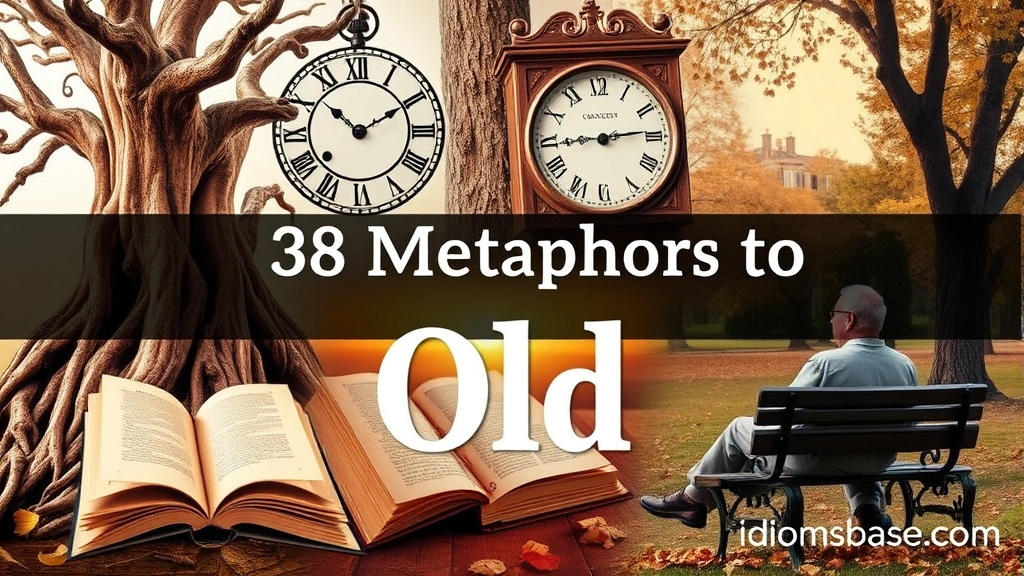Have you ever stopped to think about how we describe "old"? It's a word that carries so much weight, so many different feelings and images. Sometimes it's about wisdom and experience, other times it might hint at weariness or a bygone era. But one thing's for sure: "old" is rarely just "old." It's a concept rich with nuance, and what better way to capture that richness than with metaphors?
Metaphors are like magic keys that unlock deeper understanding, painting vivid pictures in our minds. They help us connect abstract ideas to concrete images, making complex notions relatable and memorable. So, if you're looking to express the multifaceted nature of "old" with a touch of flair, you've come to the right place! Get ready to explore 38 fantastic metaphors that will elevate your language and spark your imagination.
38 Metaphors for "Old"
Let's dive into this treasure trove of linguistic gems! Each metaphor offers a unique lens through which to view the concept of old.
Metaphors Highlighting Wisdom and Experience
These metaphors emphasize the positive aspects of aging, focusing on the accumulated knowledge and insight that comes with time.
- A well-worn path: Just like a path that's been walked many times, showing signs of countless journeys, an old person has traveled through life, gaining experience with every step.
- A seasoned oak: An oak tree stands tall and strong, its rings telling stories of decades, even centuries. Similarly, a seasoned individual has weathered many storms and grown resilient.
- A living library: Imagine a library filled with countless books, each holding a unique story. An old person is a living repository of memories, lessons, and wisdom.
- A deep well of knowledge: A well provides essential water, and a deep one suggests an endless supply. This metaphor speaks to the profound and extensive knowledge an older person possesses.
- A finely aged wine: Wine gets better with age, developing rich, complex flavors. This metaphor beautifully illustrates how character and wisdom deepen over time.
- A weathered map: A map that's been used and folded many times shows the routes taken and the destinations reached. An old person carries the marks of a life well-traveled.
- A sturdy anchor: An anchor provides stability and prevents drifting. An old person can be a source of steadfastness and guidance for others.
- A guiding star: Just as stars have guided travelers for centuries, an older person can offer direction and insight based on their life's journey.
- A time-tested recipe: A recipe that has been passed down through generations is proven to be excellent. This suggests reliability and enduring quality.
- A historical landmark: Landmarks stand as testaments to the past, holding stories within their very structure. An old person is a living piece of history.
Metaphors Highlighting Wear and Tear
These metaphors touch upon the physical or historical aspects of "old," often implying a sense of age or even decline.
- A crumbling fortress: While once mighty, a fortress eventually succumbs to the elements, showing signs of decay. This can refer to physical aging or something that is falling apart.
- A fading photograph: The colors in an old photograph soften and dim over time. This metaphor evokes a sense of nostalgia, but also a gradual loss of vibrancy.
- A rusty hinge: A hinge that's been around for ages might be stiff and creaky. This suggests a lack of smooth movement or functionality.
- A tattered flag: A flag that has flown through many battles and storms will be worn and torn, bearing the marks of its history.
- An antique clock: An old clock might still keep time, but it carries the visible signs of its age, perhaps with a charming tick-tock.
- A well-loved teddy bear: This suggests something that is old, worn, but cherished and full of sentimental value.
- A moth-eaten tapestry: A beautiful tapestry, over time, might develop holes from moths, indicating its age and delicate state.
- A ghost of its former self: This implies something that has lost much of its original substance, power, or vitality.
- A relic from another era: A relic is an object that has survived from a much earlier time, often with historical or sentimental significance.
- A forgotten melody: A melody that is old might be rarely heard, suggesting something that has faded from common memory.

Metaphors Highlighting Enduring Presence or Legacy
These metaphors focus on the lasting impact or continued existence despite age.
- A persistent whisper: A whisper can be soft, but if persistent, it continues to be heard. This suggests something old that subtly remains.
- A deep-rooted tree: A tree with deep roots can withstand strong winds, symbolizing resilience and a strong foundation built over time.
- An echoing memory: Memories can persist and resonate long after the events themselves. This speaks to the lasting impact of old things or experiences.
- A timeless classic: Some things never go out of style, retaining their value and appeal regardless of their age.
- A foundation stone: The oldest part of a building, a foundation stone provides support and stability, representing something essential and enduring.
- A sturdy bridge: A bridge connects places, and a sturdy one implies it has stood the test of time, facilitating journeys for many.
- A constant hum: A low, continuous sound, a constant hum suggests something that is always there, always present.
- A deep current: Currents in water are powerful and enduring, representing an underlying force that has been present for a long time.
- An old growth forest: These forests are characterized by ancient, towering trees, symbolizing immense age, complexity, and a thriving ecosystem built over centuries.
- A sacred trust: Something that has been passed down through generations, implying its importance and the responsibility to preserve it.
Playful or Nuanced Metaphors
These metaphors offer a more whimsical or specific take on "old," often with a touch of humor or a unique perspective.

- A senior citizen of the gadget world: A playful way to describe an outdated piece of technology.
- Past its prime, but still kicking: Suggests something is old but still functional and perhaps even feisty.
- More antique than vintage: "Antique" often implies greater age and rarity than "vintage."
- Ready for retirement: Implies something is at the end of its working life, ready for a well-deserved rest.
- One foot in the grave, the other on a banana peel: A humorous, somewhat morbid metaphor for being very old and perhaps a bit clumsy.
- Collecting dust bunnies: Implies something is old and unused, gathering dust.
- A golden oldie: A term often used for popular songs from a bygone era that are still loved.
- An elder statesman: Refers to an experienced and respected figure, often in politics, who continues to offer advice.
Key Takeaways
- Metaphors enrich language: They transform simple descriptions into vivid images, making your communication more engaging and memorable.
- "Old" is multifaceted: There are many ways to describe "old," from wise and experienced to worn and historical.
- Context is key: The best metaphor for "old" depends on the specific nuance you want to convey.
- Creativity sparks connection: Using unique metaphors helps you connect with your audience on a deeper level.
Frequently Asked Questions (FAQ)
Q1: Why are metaphors important when describing "old"?

Metaphors are crucial because the word "old" can be quite bland and even carry negative connotations. By using metaphors, you can infuse your descriptions with specific feelings, imagery, and deeper meaning. They allow you to highlight wisdom, resilience, fragility, or historical significance, making your language much more evocative and precise.
Q2: How can I choose the best metaphor for "old" in my writing?
Think about the specific aspect of "old" you want to emphasize. Do you want to convey wisdom? Choose a metaphor like "a living library." Are you highlighting wear and tear? "A rusty hinge" might be perfect. Consider your audience and the overall tone of your writing as well. A playful metaphor might be great for a lighthearted piece, while a more serious one suits a formal context.
Q3: Can these metaphors be used for things other than people?
Absolutely! Many of these metaphors can be applied to objects, ideas, concepts, or even institutions. For example, "a crumbling fortress" could describe an old building or an outdated system. "A time-tested recipe" could refer to an effective strategy that has endured. The beauty of metaphors is their versatility.
Q4: Are there any metaphors for "old" that are considered offensive?
While the metaphors listed here are generally safe, some colloquialisms or slang terms for "old" can be derogatory or ageist. It's always important to be mindful of your audience and the context. Avoid terms that might stereotype or demean older individuals. Focus on metaphors that are respectful and contribute positively to your message.
Q5: How do metaphors help with SEO?
While metaphors themselves aren't direct SEO keywords, using rich, descriptive language and varied vocabulary can improve the overall quality and readability of your content. This, in turn, can lead to better user engagement, which search engines like. Additionally, by exploring different facets of "old" through metaphors, you naturally broaden the semantic scope of your content, potentially attracting a wider range of related search queries.
Conclusion
We hope this journey through 38 metaphors for "old" has inspired you! Language is an incredible tool, and by embracing the power of metaphors, you can transform your everyday descriptions into vibrant, memorable expressions. So go forth, experiment, and let your words paint pictures that truly resonate. What's your favorite metaphor for "old"? Share your thoughts and let's keep the conversation going!





